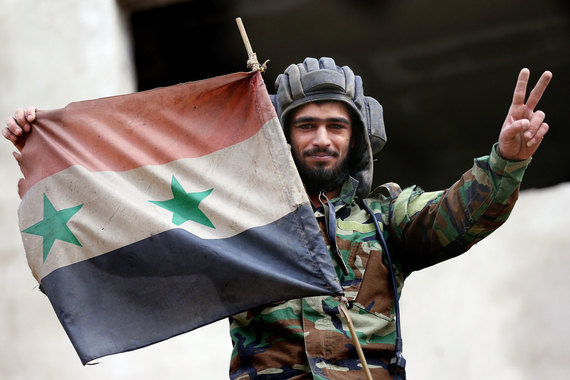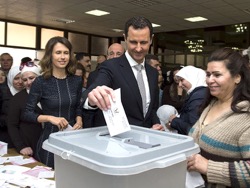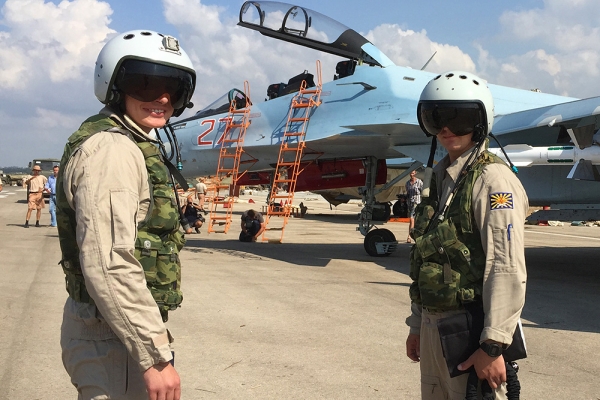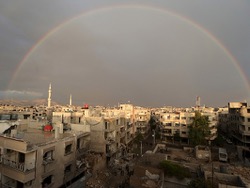
Experiences of a girl travelling to Syria hitchhiking
Today we publish the last of 30 stories selected for”travel writing Competition”, which “Tape.ru” conducted with the support of “the Rambler.Travel”.
Museums are closed or looted, in the tourist centers gathering dust piles nobody the necessary maps, in the castles of the crusaders long live the soldiers, and photograph in the centre of the capital would be long to explain to the military… Of the journey through the once prosperous Syria in October 2014 (in the fourth year of the civil war) tells Anastasia Pimpin.
I must say: cherry and generous, Syria still exists. Not only on the map, in the virtual space, the hearts of Syrian patriots, but in reality. Stripped down on the area, somewhere sacred, somewhere deserted, torn Syria continues to live. And the Syrians, as before, to remain as friendly people, ready as selflessly’re the restless hearted and to help the foreign guest.
We drove into Syria from Lebanon. After microvascularity Lebanon, jammed Packed mountains and to the Mediterranean sea, Syria is thought the present power — giant of the road, endless scenery, cities and towns on the way. In Syria the scope and breadth that is lacking in close Lebanon.
The border was crossed by hitchhiking. In the buffer zone we were picked up by taxi driver Christian Syrian woman from fashion on Board. The Syrian woman, after learning that we were from Russia, has resolved all our issues with the border guards, it had thrust us a couple of bottles of whiskey for transportation. Neither the taxi driver nor the passenger of a word didn’t know English, we’re Arab owned quite “Kalil” (a little bit). But this did not prevent us to understand each other, drive to Damascus, passing dozens of test posts, and cute bow in the centre of the capital.
Damascus met in autumn is quiet and warm. Occasionally the silence was split by the roar of artillery in the suburbs is not the first year there are full-scale battles. Mansions on the main streets somehow cozy faded, dilapidated. The atmosphere of decadence is hopeless from a protracted war, but still in Arabic jaunty, life-affirming. Passers-by with interest, surprise looked at us (we walked with tight travel backpacks stuffed behind), came, spoke, asked where we are, whether we need help.
The tourist and the foreigner, in Damascus now a rarity. European diplomatic mission left Syria on the eve of big events. Before the war in Damascus to imagine such a thing was simply impossible. When the locals find out that we are Russian, we almost applauded: “Thank you, Russia!”, “Abu Ali Butin” (hero Putin), “Lavrov”… is what is associated here Russia almost at all, instead of the usual vodka, matryoshka and bears.
Central street is partially blocked to cars. On the approaches to pedestrian zones are the posts — check the documents, the contents of the bags. In Piazza Marget, at the monument of a Telegraph pole, constantly hanging around refugees. They are easily calculated by their outside appearance and behavior — men in Bedouin robes shuffle on the edge of the pavement, women in dark dresses-bags have followed them… With an expectant, lost eyes, they came here from different parts of the country and who live in a hotel right on the lawns.
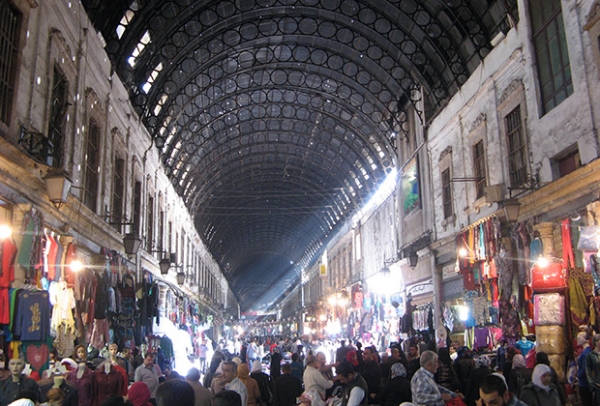
Al-Hamidiya — the main market of the capital — alive
Photo: Anastasia Pimpin
1/4
Our budget hotel near Russian cultural centre is no exception. It is densely populated non-capital residents. They live, usually with the whole family in one room (and Syrians families are large, from three to four or more children) for months in anticipation. Expect, as a rule, one is when they manage to leave their country…
Al-Hamidiya — the main market of the capital — alive. Pulsating in the normal rhythm of the middle Eastern Bazaar, the noise, the DIN, the shouting of merchants in the crowd. No hint of war.
In the “old town” life flows measuredly also is in closed courtyards, caravanserais noisy fountains, restaurants. In the Khan Assad Pasha met even students, learn play. However, cafés and souvenir shops have become much smaller, and hostels don’t have any. The famous Umayyad mosque in spirit now resembles an ordinary Bazaar mosque. Empty, quiet and huge. But once thousands of Muslim and Christian pilgrims from all over the world flocked here to venerate the relics of the prophet Yahweh (John the Baptist). And the noise, hubbub, fuss stood there not less than at the Bazaar.
Major museums — the national Museum of Damascus, Damascus, the fortress is closed until better times, the congregation moved into a secure vault. The Syrians are trying to avoid what happened with the National Museum of Aleppo and the Museum of the city of Hama, which had been looted by bandits. As locals say, the antiquity of these museums catalogs are sold abroad on the black market of Antiques.
A couple of days later by bus we went to the coast, Latakia is a port city, one of the safest places in the country. On the middle finger of each was hanging on tactice. Tactica now chief baby trend of Damascus. It is impossible not to notice or ignore. With tactical on your finger there go almost all the children. Tablets, iPods or phones they have. Electricity constantly shut off — that and kids running around, chattering tactically.
Tactica are two dense plastic ball on a string. The rope is attached to the ring, the ring is threaded on the middle finger. The player hits the balls so that they converge under the hand and over the palm. The toy produces a characteristic knock. Children in Syria a lot, so the sound of taktyki in Damascus came from everywhere day and night. Tactica on our fingers immediately had local. We repeatedly used.
The bus to Latakia was walking through HOMS. Cut the Damascus — HOMS here and there showed traces of the war: the destroyed Haraszti, a suburb of the capital, burned refueling on the way home shot. But the roads themselves fighting in Syria are in excellent condition, better than in Russia in a peaceful environment.
To check out the bus we came out with the passports and tactically on your finger than incredibly amused the military, but when they learned that we Russians asked permission to take a picture with us in memory.
From HOMS to the coast began another peaceful Syria — olive Mediterranean idyll, ruined by the war. A minimum of roadblocks and orange plantations along the road, tractors in the fields. We stopped in the seaside village outside the city. Before the war the village died out for the winter. Now people live here year round. Warring provinces came a lot of refugees, especially many people from Aleppo and its environs. Evening in the village of noisy — electricity cut off — and children and adults go to the seaside, to communicate, as in Russia in the pre-Internet era.
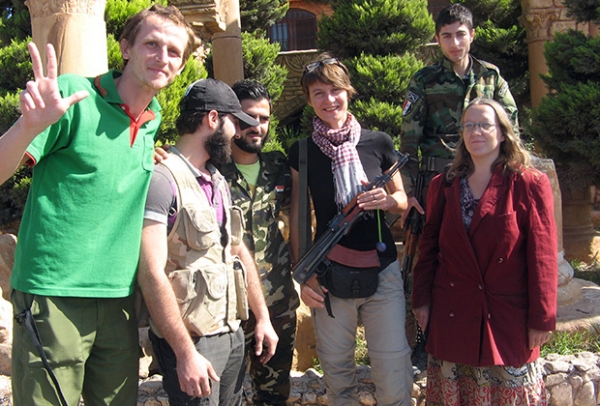
Upon learning that we were from Russia, bearded men with “results” immediately asked permission to take photo with us
Photo: Anastasia Pimpin
1/3
Along the coast we drove the hitchhiker to the castle of marqab – powerful citadel of the crusaders on a steep hill behind the town of Banias. Hitchhiking turned out to be tense. Not because the drivers did not ride, but because for us is very worried, tried to land at checkpoints and to cram into a local bus. Any slackness in moving! In the end, after long discussions with the drivers, multiple repetitions of memorized phrases in Arabic, slowly but surely we got to the Markab.
New knights of the XXI century in the Markab is a sturdy, bearded men with “results”, very similar to a simple hard-working “Selyakov”. Knowing that we are Russian, made us feel very welcome, had a wonderful tour around the perimeter of the huge citadel, closed, of course, for any visit.
The fortress is also the participant of that war, received its wound. A couple of months Markab was under the control of militants. During this time they managed to dismantle part of the wall, ransack a Museum inside the citadel. Fortress and to this day remains an important Outpost in the defense of the region. The soldiers from the top of the castle showed us on the hills, stretching from the sea, and repeated “Days, daish” (ISIS in Arabic).
After the tour the soldiers, with the characteristic of the Syrians care about the guests, invited us for tea. Live CSKA in the former divan-Khane, the office of the Sultan at the barracks — iron bed, covered with gray woolen blankets, the stone table of the era of the crusaders, gas burner, window, covered with rags from “cuckoos” (the so-called snipers here). We drank sweet tea on the Syrian neatly laid bedding for the rough-hewn table, Smoking adrenalie Syrian roll-UPS, carefully glancing out the window at the sea. Bow and thanking for the hospitality, went further.
Under Latakia visited another historical place — Ugarit — an ancient Phoenician settlement on the Mediterranean, formed about 8,000 years ago. The Ugarit is known primarily not for its ruins, and cuneiform tablets. In the Ugarit was found earliest in the history of mankind the alphabet. But neither signs, nor of the alphabet we, unfortunately, did not see, now everything is closed in storage. But on closed for visiting the excavations, we were allowed to visit.
Short visa was coming to an end, it was time to leave Syria is welcome. We had hoped to travel by land to Turkey through the Armenian town of Kasab in Northern Syria.
Came to the crossing and gasped — Syrian pornpost broken, scorched, border guards continue to serve in the most austere conditions.
The Kasab, Kasab amazing, once-blooming Kasab, autopause in orange and lemon gardens green bowl of the mountains, still reeling from the Islamist attacks that occurred in March. Home wounded, crippled the temple, destroyed the school, the streets are not crowded, tense soldiers — the first thing that caught my eye. The transition is under the control of the Syrian army, but the Turks have closed their side of the border (this despite the fact that Turkey keeps the border open for travel on the crossings controlled by anti-government groups!). As a result, thousands of people can’t leave sandwiched in the grip of war Syria the shortest way, and are forced to get out of wherever it’s through Lebanon or by sea.
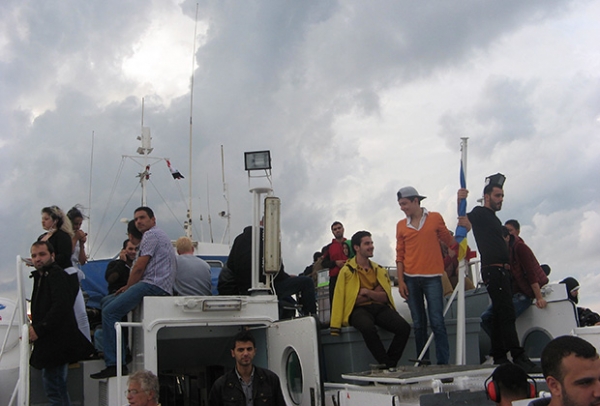
Refugees flee Syria, possibly forever
Photo: Anastasia Pimpin
1/2
We left Syria by boat-catamaran from Latakia to the Turkish city of Mersin. The ship under Moldovan flag with Syrian migrants and the Turkish crew. Departure was delayed for four hours. Border guards carefully checked each passenger. And we were called to a special office.
Finally, cast off. From the Bay our fragile boat brought tug with the Syrian head on the deck. They looked at each other — a crowd of Syrian workers, happily excited that, finally, the Syrian coast and began to move away from them, and chief in tow — gloomy-serious, focused. One of the passengers turned to me and said: “I am happy that I am leaving this country!” His joy surprised me. Back then, the Syrian authorities do not accept anyone, they all have a one way ticket. And leaving, they lose their Homeland, perhaps forever. As the white emigrants after the revolution, Russia lost. Probably, they have not yet realized, and Syria doesn’t realize it yet… And what will this new Syria and whether it will bloom again, but without these people — time will tell…

